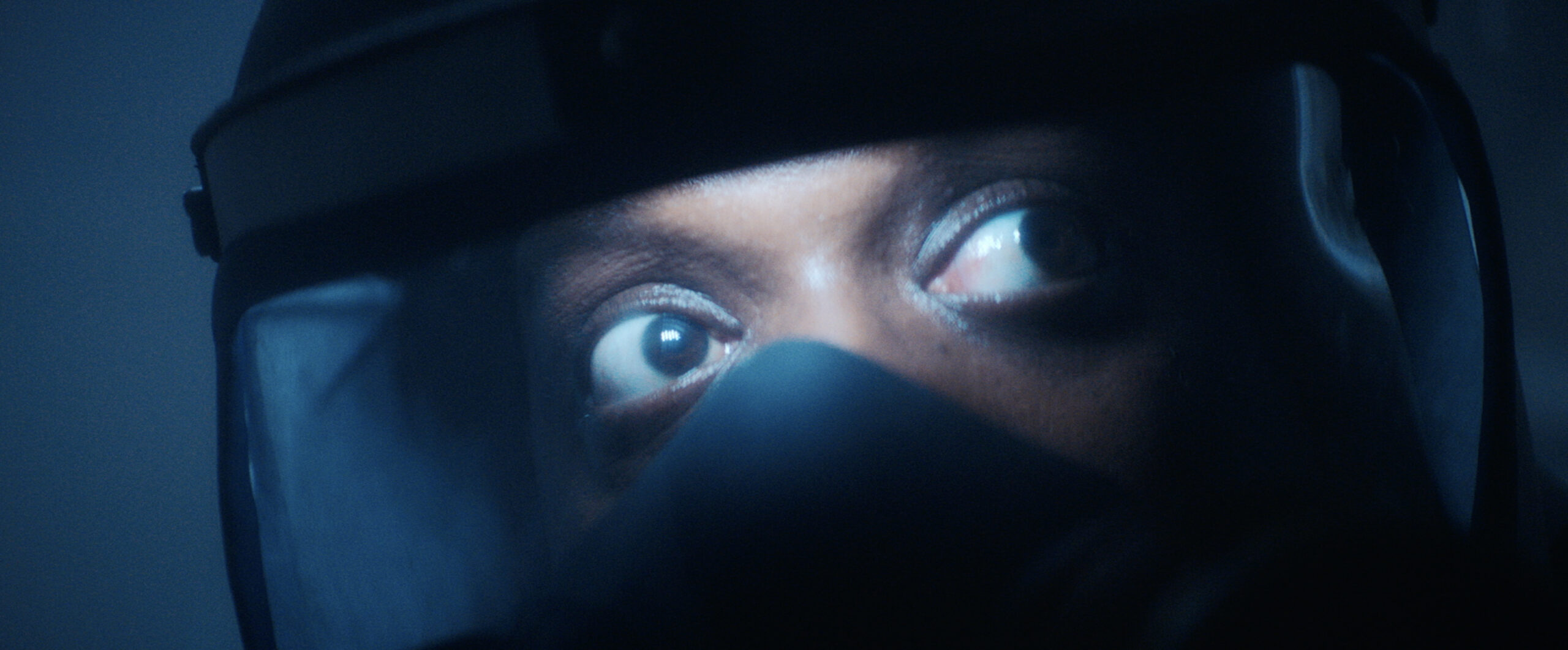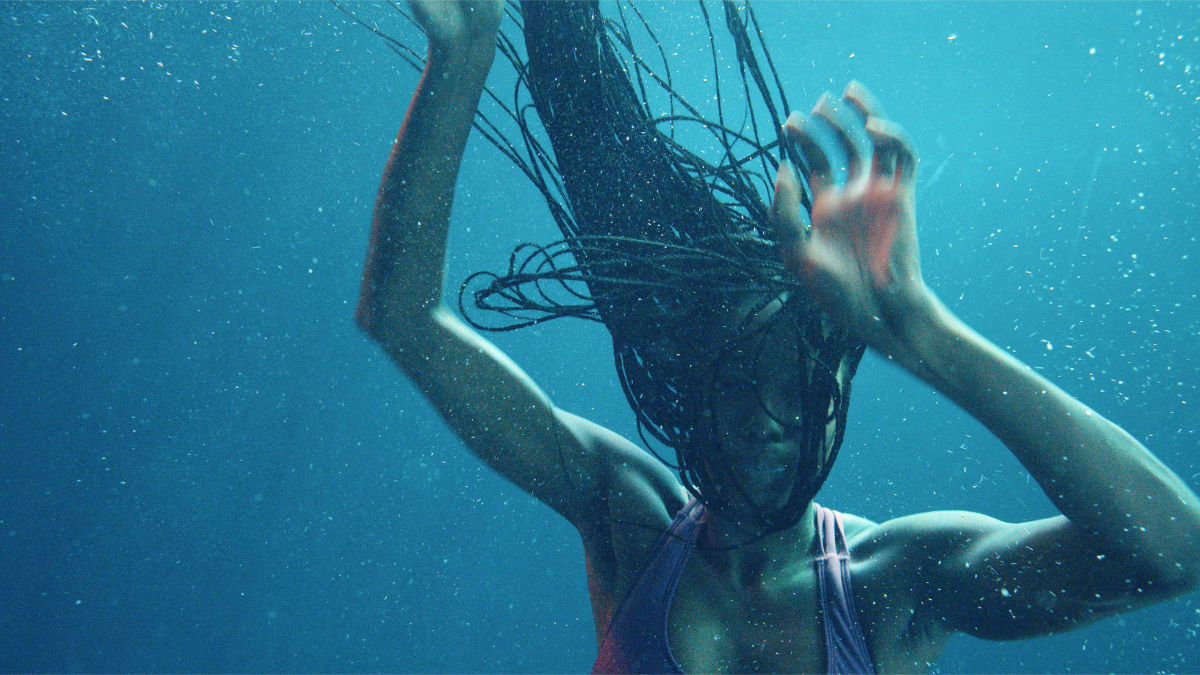
Twice As Good, dir. Jeremy Ngatho Cole
Five Black filmmakers on their sci-fi visions of the future
The new Film4 anthology series Foresight offers a glimpse into realms of the future from Black and brown directors.
Dominic Cadogan
09 Jan 2022
While sci-fi nerds may love Black Mirror, we could still do with more actual Blackness in the genre at large. Enter Foresight: a new anthology series from Film4, exploring the endless possibilities of where the future might take us, from the perspective of five Black and brown directors.
Inspired by the uncertainty of Brexit (sadly, still ongoing), the series gave Nadia Latif, Akinola Davies Jr, Adeyemi Michael, Jeremy Ngatho Cole, and Elliot Barnes-Worrell the chance to experiment with what the genre means to them, pulling from personal experiences and paying homage to classic favourites.
Naturally, it’s an exciting prospect, seeing yourself reflected on the screen in front of you, especially in spaces you rarely do. Yet, rather than simply creating a variety of fantasy worlds, instead, the five films go deeper, offering each director an opportunity to find new ways of examining the lens of race and the Black experience through the infinite probabilities of sci-fi. Think futuristic technology, new norms, and potential crises – made to feel tangible thanks to each director’s deft hand and diverse casts.
The future can sometimes look bleak and scary too, and Foresight’s offerings are equally stark. Despite this, the viewer (whether a person of colour or not) is invited to reflect on their themes – from Black parenthood and community to religion – so that the far-off future can be used as a tool to shape the present and make something better for tomorrow.
We speak to each of Foresight’s directors to find out more about the worlds they created and the importance of diverse and representative storytelling in the sci-fi genre and beyond.
Nadia Latif
For theatre-maker and director Nadia Latif, Foresight gave her the opportunity to build on her knack for subverting audience expectations, previously seen via her 2020 BFI-funded horror short WHITE GIRL. For her latest project, the director collaborated again with writer Omar El-Khairy and while the duo didn’t initially set out to create a sci-fi film, they found the liberation to do so after choosing to focus on the topic of mind and body control.
The story quickly presented itself, centering around the film’s Muslim protagonist. “They Heard Him Shout Allahu Akbar is set tomorrow, or even today. It tells the story of Zaid, recently released from prison, realising that a condition of his release is that arms of the state now control his body and mind,” Latif explains. “I like the idea of it as an only slightly alternate reality.”
The mundanity of a life that looks mostly familiar to viewers interspersed with frenetic, heart-pounding shots – amped up by a soundtrack courtesy of Gaika – paired with Zaid’s isolation and limited dialogue draws the viewer in to feel exactly as he does.
For Latif, this was essential for highlighting the message underpinning the film. “This is the everyday reality for many Muslims in this country: scrutiny, fear, judgment, and misconception,” she says. The sci-fi elements are just meant to bring you closer to the character (and create) empathy for and solidarity with the experience of Muslims living under constant scrutiny.”
Akinola Davies Jr
Despite simultaneously straddling both the future and the past (or at least a glamourised retro version of it of it), the starting point for Akinola Davies Jr’s X US was inspired by present-day events. “We were right in the midst of Brexit, hearing about it over and over again, the Windrush scandal too,” he tells gal-dem. “This seeped into a lot of my thinking about how history repeats itself and we’re all participating in the same mistakes over and over again.”
Simplifying the feeling of discomfort and apprehension familiar to many people of colour, the short explores a similarly familiar setting: an airport (of sorts) and the anticipation of travelling somewhere unknown. It’s warped with layers and layers of unease: the black-and-white visuals, ominous soundtrack, and general sense of foreboding, thanks to the manic faces that loom in the background almost throughout the film.
In exploring sci-fi, the director was able to make allusions with the genre and the modern Black experience – a connection that can be used for future inspiration for all creatives taking up space in industries that don’t represent them. “You are creating magic in a space where you are othered, in many instances with little or no resources,” he says. “It allows us to play with a lot of theory, but we don’t need to look too far from where we are to see that in every corner there is magic happening. We just need to be a little more cognisant of it and value its beauty for ourselves.”
Adeyemi Michael
Of the anthology series, Adeyemi Michael’s The Future Isn’t What It Used To Be is by far the most dystopian – imagining a world 60 years in the future where climate change has forced the majority to leave Earth, leaving behind nomadic survivors.
With sweeping shots of lonely landscapes, the short is devoid of dialogue, soundtracked by a blaring alarm or the emotional whimpers of the two main characters. “I opted to shoot the film in a more fluid way whereby action takes place in either one shot with a creeping zoom,” Michael explains. “Coverage was avoided as I felt that the kind of film we were making needed to sit with the characters’ emotions.”
Yet, even with the more esoteric POV, the viewer is able to draw their own conclusions of isolation, togetherness, and community from it. “I wanted the audience to really feel each character’s state of isolation, but that there was an opportunity for community,” he reflects. “To feel that if they tapped into their innate humanity, there could be hope of having something more than what they all seem to be left with.”
It’s a concept that resonates personally with the director, especially after this project. Through an exploration into the unknown world of sci-fi, he and his fellow directors have opened up new opportunities to discuss topics important to them. “I challenge my fellow Black and brown filmmakers to be bold and inventive with their creative choices when it comes to storytelling,” he asserts. “Black filmmakers can set their own terms; we just have to decide which subject matter and genre we want to do that with.”
Jeremy Ngatho Cole
Twice As Good is director Jeremy Ngatho Cole’s foray into narrative fiction, following a slew of documentaries and music videos with Little Simz and Michael Kiwanuka. It’s an intimate story that feels deeply personal, exploring the challenges of Black parenthood.
The title leans into a familiar trope for people of colour are raised on – that you must be ‘twice as good to get half as far’ – quietly musing on the pressures that inevitably creates. “I wanted to explore communication between generations,” Cole says. “Both parents and children can be bad at listening and sometimes worse at talking because we’re used to carrying a lot of assumed knowledge.”
Through the limitless potential of the sci-fi genre, main character Dee Dee (who appears both as a child, and adult time traveller) is able to converse with his mother on the eve of his seventh birthday, giving him the unique opportunity of explaining the real-time impacts that is having on him as a young Black man, reflecting as an adult.
Rather than leading us to pick either side of the discussion as right or wrong, instead, the director hopes the film will give the audience more perspective on the struggles for each side. “Sometimes trying to understand between generations can just be hard, and that’s alright,” he muses.
Echoing his peers, Cole urges more Black and brown directors to push themselves and explore unfamiliar territory. “The more stories we can tell the better,” he concludes. “The more opportunities creatives have to grow and collaborate, the more the industry grows and the better our stories and experience become.”
Elliot Barnes-Worrell
“There is actually an explosion of Black and brown people writing Sci-fi online, novels, comics, artwork, poems etc, but England and its screen industry are moving a little bit mad,” says Elliot Barnes-Worrell, acutely aware of the lack of Black directors in the genre.
His offering, Digging, is a somewhat optimistic future, in which humans have reconnected with nature. “A future where we are in touch with the soil and the earth. A future where the mandem, galdem, and demdem provide and thrive,” he chimes. Working with poet Hasti C, the two took inspiration from the writer’s communal garden to create something that felt grounded.
The film brings balance to Foresight, ending it on a note of “hope, warmth, and empowerment”. While dealing with their individual trauma – yet never race – the focus shifts from character to character and the possibility of what could be. “For me, sci-fi doesn’t mean ‘the future’ it means what your wildest dreams are,” the director says. “In science fiction, one can imagine a world where anything can be. A world that doesn’t have gender, race, countries or any other worldly construct that we identify ourselves with or conform to. Exploring what that could look like is empowering and infinitely exciting.”
It’s a strong conclusion, encapsulating the message that underpins each film and the mantra of the series as a whole. Simply put by Barnes-Worrell: “There are no limits to Black and POC creativity.”
All five Foresight films will air on Film 4 and available on All4 later this Spring.
Nadia Latif’s They Heard Him Shout Allahu Akbar and Jeremy Ngatho Cole’s Twice As Good will be shown as part of LSFF’s Sci Fi showcase on 16 January at Curzon Soho. Elliot Barnes-Worrell’s Digging is also showing at LSSF on 20 January within New Shorts: London Lives.









